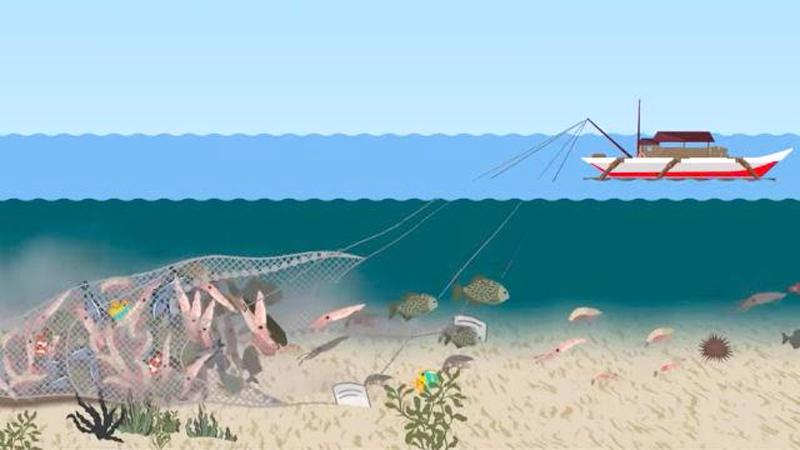
The local fisheries industry will not last long at the rate marine resources are being exploited by foreign fishing vessels, environmental pollution and the absence of a clear and consistent national policy to protect the industry, said members of the National Fisheries Association convening a media briefing last week in Colombo to highlight the plight of the fishery community.
“Speedy action to put an halt to foreign vessels encroaching our waters and exploiting the resources and polluting the marine environment is crucial to keep the local fisheries industry going,” said National Fisheries Association Past Vice President AyeshRanawaka in the wake of a report that that Sri Lanka is in discussion with Indian authorities on a program that would allow Indian fishermen to fish in Sri Lankan waters. “Encroaching our waters by Indian fishermen is nothing new but what is alarming is giving them the licence to enter our waters which will enable them to use bottom trawling which will be an ecological disaster for the country,” the conveners said.
Bottom trawling which was made an offence through the amendment of the Aquatic Resources Act in 2014 causes severe destruction to the ocean floor resulting in the depletion of aquatic resources.
A maximum prison term of two years and a maximum fine of Rs. 50,000 was imposed on bottom trawling. However, what agitates the fisheries community is banning trawling by local fishermen while blinking the green light to foreign vessels to exploit the country’s marine resources. “Over 5,000 families in Baththalangunduwa have lost their jobs due to the ban on trawling,” said One-day and Multi-day Fisheries Cooperative Society Kalpitiya Past President K.L. B. Lietan.
He said 51 boat operators got permission to carry out trawling on an identified ground Kudaramalai in the 1980s but today they have been deprived of their livelihood.
“Certain prawn varieties could be caught only by trawling. Fishermen were taught trawling methods that do not affect the sea bed through a foreign-funded project,” Lietan said. Fisheries Association representatives said they were displeased over the spate of destruction to aquatic resources in the country by ruthless elements. “Promoting tourism at the expense of the environment is not sustainable. The importance and sustainability of the marine economy which is also known as the blue economy has been underpinned in the UN Sustainable Development Goals,” National Fisheries Association representatives said.
The direction of sewage from apartments, drawing telecommunication cables across coastal areas, preventing cage culture for fishing at the Bolgoda lake to promote tourism were pointed as some of the destructions caused to marine life and obstructions to sustain the fisheries industry. Fisheries trade union representatives calling for urgent amendments to the laws pertaining to the fisheries sector to stop the exploitation of the country’s marine resources by foreign fishing vessels said the current legislation governing the fisheries serves the interest of the foreign entities exploiting the seas within the country’s boundaries.
The Fisheries and Aquatic Resources Act No. 2 of 1996 was the fisheries legislation limited to Sri Lankan waters. This provided the legal basis for management, conservation regulation and development of fisheries and aquatic resources of Sri Lanka. This local legislation was strengthened by a series of regulations framed under the same Act.
Fisheries Association representatives also said the fisheries industry cannot be sustained for long as the next generation is not willing to continue the ancestral occupation. “Those who are currently engaged in the industry are those above 50 and they would retire soon,” a Fisheries Association representative said. On speculation of a surge in fuel prices, members said prices should be maintained at the current levels rather than increasing it which would further burden fisher-folk who are yet to settle loans. Fisherfolk across the country were in dire straits during the past year due to the pandemic that brought transportation and movement to a halt triggering a sharp drop in sales. The fisheries sector comprises over 300,000 direct and over one million indirect beneficiaries contributing around 1.5 percent to the GDP.
